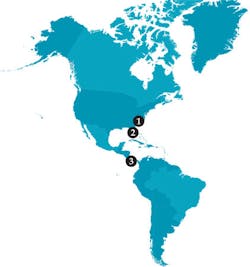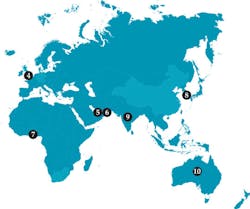World News
1) US: North Carolina
A new study from Duke University suggests that naturally occurring brines, not man-made fracking fluids, account for most of the wastewater coming from hydraulically fractured unconventional oil and gas wells. Published in the journal - Science of the Total Environment - the findings revealed that more than 92% of the flowback and produced water - or wastewater - coming from the wells is derived from naturally occurring brines that are extracted along with the gas and oil. However, researchers warned that these brines still carry their own risks, as they contain varying levels of salts, heavy metals and naturally occurring radioactive elements, and their sheer volume makes disposing of them a challenge.
2) US: Florida
The share price of AquaVenture Holdings has been steadily increasing following an initial public offering in October. The company debuted on the New York Stock Exchange on October 6 with 6.5 million shares priced at $18 per share, raising $117 million. The share price was trading at $22.40 in October, over 24% above the IPO price. Through a Water-as-a-Service business model, the company’s plan is to acquire existing thermal desalination facilities and upgrade them to membrane, reverse osmosis-based projects. AVH’s subsidiaries include US point of use firm, Quench, as well as Seven Seas Water, which provides desalination and wastewater treatment solutions.
3) Nicaragua
Water utility ENACAL has awarded Spanish firm ACCIONA Agua a €5 million contact to construct a wastewater system for the city of La Trinidad, in northern Nicaragua. In a joint venture with project company BTD, the work will be carried out over 18 months with the aim to facilitate access to sewerage services to around 9,000 people. A sanitation network with 17.7 kilometers of piping and the construction of a number of water treatment systems, as well as all the exterior work required, will be provided. It will be financed through a Central American Bank for Economic Integration loan.
4) UK
Smart water meter deployments across Europe will increase by 28% over the next ten years from an installed base of 11 million meters. That’s according to a new report from Bluefield Research, which predicts that big data will play a key role in the water industry moving forward. As part of the progression to smart technology, Bluefield said there will be an increased use of advanced meter technologies to enable more real-time network and customer analytics. A key drive for this is non-revenue water, which accounts for on average 20% across European utilities.
5) Ajman, UAE
A wastewater recycling plant has been expanded to 9,000 m3/day in the Emirate of Ajman using ultra filtration and reverse osmosis membranes. The expansion adds an extra 2000 m3/day of capacity and was completed in three months. Operator SAFI, a public-private partnership between the municipality of Ajman, consultancy BESIX and Veolia was established in 2011. The plant was the first in the region to bring the concept of recycled water fully into practise for industrial and domestic uses, according to BESIX.
6) Ras Al Khaimah, UAE
The Ras Al Khaimah Wastewater Authority has awarded Veolia Water Technologies a contract to upgrade the Al Fileyah wastewater treatment plant in the United Arab Emirates. The contract includes the engineering, procurement and construction of the Al Fileyah plant, including supply, construction, commissioning and performance testing.
Plant capacity is expected to be doubled, from 20,000 m3/day to 40,000 m3/day with 12 months slated for project delivery. UASB Bioreactors will be provided by Veolia subsidiary Biothane.
7) Ghana
Mining company AngloGold Ashanti has renewed a contract with Veolia Ghana Limited to operate and maintain a water treatment facility at the Iduapriem mine. Located in the Western Region of Ghana, Iduapriem is an open-pit gold mine with an annual average gold production of about 220, 000 ounces and a recovery factor of about 95.8%. Veolia said it has been operating the site for two years, during which it achieved an 81% plant recovery rate and 100% compliance with the Ghana Environmental Protection Agency discharge limit.
8) South Korea
French company SUEZ has signed a five-year partnership with South Korean company NK to develop ozone generators for ballast water treatment systems. The two companies hope to tap into the developing ballast water market and to date have sold 400 ozone systems, after Suez invested in a manufacturing facility in Tianjin, China in 2010. The treatment of ballast water, used to balance ships, will soon be regulated through an agreement drafted by the International Maritime Organisation. New regulations will enter into force on September 8, 2017 and commit 52 member states to minimise the transfer of harmful aquatic organisms and pathogens, by equipping their fleets with ballast water treatment systems.
9) India
The Municipal Corporation of Greater Mumbai has awarded SUEZ a contract to design, build and operate the 37,000 m3/day Colaba Wastewater Treatment plant. The three year construction contract will be followed by 15 years of operation amounting to a total of €42 million of revenue for SUEZ. Mumbai, with a population of more than 15 million, has seen intense urbanisation and population growth over the last few decades resulting in increasing pressure on water resources.
10) Australia
A 5.2% stake in the controversial Victorian Desalination Project has been sold off by Pacific Partnerships to AMP Capital. The acquisition is funded by the AMP Capital Community Infrastructure Fund (CommIF). The AUS$3.5 billion project was awarded by the Victorian government to the AquaSure consortium (SUEZ and Thiess) to finance, design, build, own and operate over 30 years. However, the 450,000 m3/day desalination plant was designed to provide water for four million people until 2039 but was put on standby after Australia’s drought eased. The Victorian government came under fire this summer for placing an alleged 50 gigalitre order of water from the facility, which the opposition party claimed was not needed.
More Water & WasteWater International Archives Issue Articles


